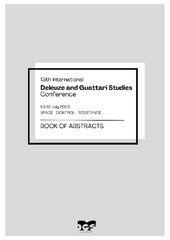Приказ основних података о документу
Genealogy as a Way of Building a War Machine – Critique and Resistance in “Deleuze’s Foucault”
| dc.creator | Urošević, Milan | |
| dc.date.accessioned | 2023-10-19T09:29:40Z | |
| dc.date.available | 2023-10-19T09:29:40Z | |
| dc.date.issued | 2023 | |
| dc.identifier.isbn | 978-86-82324-44-7 | |
| dc.identifier.uri | https://ifdt.bg.ac.rs/wp-content/uploads/2023/06/DGS2023-Book-of-Abstracts.pdf | |
| dc.identifier.uri | http://rifdt.instifdt.bg.ac.rs/123456789/3001 | |
| dc.description.abstract | The question of resistance has been a long-debated topic in the study of Foucault’s work. The interesting thing about this debate is that various authors came do differing conclusions, some point out that Foucault’s understanding of power leaves no space agency while others claim that his entire work can be seen as a study of possibilities for resistance. Even though this debate started in Foucault’s own lifetime it is still on going and contemporary scholarship has started dealing with new problems concerning his notions of resistance. Some of those problems are the relations between collective and individual acts of resistance and the relation between critical scholarship and political resistance. Our aim is to contribute to this debate by reinterpreting Foucault’s understanding of resistance through Deleuze’s reading of Foucault and through Deleuze’s concepts like the “war machine”, “nomadism” and others. In the first part of our presentation, we will use Deleuze’s reading of Foucault to reconstruct his notion of resistance and how it relates to other important concepts in his work, like power and the subject. In the second part we will move on to Foucault’s understanding of critique and the problem of its relation to resistance. While specifically relying on Daniele Lorenzini’s reading of this problem we will point out that Foucault’s research into various institutions of modernity (like the prison, the hospital, or the asylum) can be seen as a study of possible “lines of flight” or possibilities for resistance to technologies of government that are active within them. We will conclude by pointing out that Foucault’s understanding of critical scholarship can best be understood as an attempt to connect various subjects of resistance into a rhizomatic movement or a war machine whose structure mirrors that of the governmental dispositive. | sr |
| dc.language.iso | en | sr |
| dc.publisher | Institute for Philosophy and Social Theory, University of Belgrade | sr |
| dc.publisher | Faculty of Media and Communications | sr |
| dc.publisher | University of Plymouth | sr |
| dc.relation | "info:eu-repo/grantAgreement/MESTD/inst-2020/200025/RS//" | sr |
| dc.rights | openAccess | sr |
| dc.rights.uri | https://creativecommons.org/licenses/by/4.0/ | |
| dc.source | 15th International Deleuze and Guattari Studies Conference | sr |
| dc.title | Genealogy as a Way of Building a War Machine – Critique and Resistance in “Deleuze’s Foucault” | sr |
| dc.type | conferenceObject | sr |
| dc.rights.license | BY | sr |
| dc.citation.spage | 112 | |
| dc.citation.epage | 113 | |
| dc.type.version | publishedVersion | sr |
| dc.identifier.fulltext | http://rifdt.instifdt.bg.ac.rs/bitstream/id/10283/DGS2023-Book-of-Abstracts.pdf | |
| dc.identifier.rcub | https://hdl.handle.net/21.15107/rcub_rifdt_3001 |

